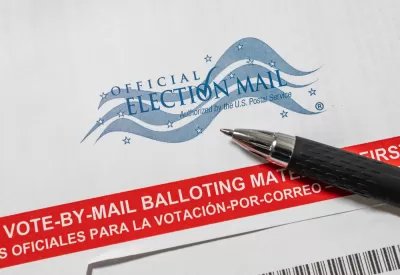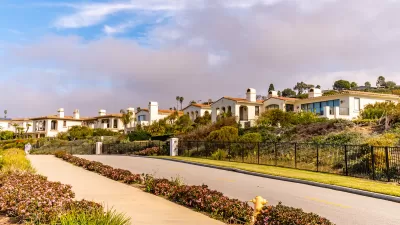Transit and environment came out on top on state and local ballots nationwide, while housing and marijuana initiatives proved less popular with voters.

As the dust settles from Election Day 2024, many urban planners and related professionals are pondering just what a second Trump presidency could mean for national policy on crucial topics like transportation, environment, housing, and more. While a shift in federal priorities could have a major impact on these areas, voters at the local and state levels signaled an inclination to support public transit, infrastructure investment, and environmental protection measures. However, some states and cities roundly rejected pro-housing measures.
Of particular note were ballot measure outcomes in Columbus, Ohio, and Nashville, Tennessee, that green-lighted extensive bus system funding. Ballot measures aimed at improving water quality, coastal restoration, and green space swept the board from coast to coast. On the flip side, housing initiatives had a rough go of it, with California voters rejecting rent control and a constitutional amendment that would have made it easier to pass city and county bond measures for housing.
Here is a rundown of the Election Day 2024 state and local ballot measures and results that jumped out at us:
Energy/Climate
Washington
Washington Initiative 2066: Voters approved this statewide ballot initiative, which will require utilities to provide natural gas service to any person or business who requests it. (King 5 News)
Washington Initiative 2117: Washington voters rejected an initiative that would have repealed parts of the Climate Commitment Act of 2021. Programs that will remain in place include the Cap and Invest Program that funds Move Ahead Washington public transportation grant programs, which is set to provide $3 billion for public transportation over the next 16 years. (Governing)
Environment/Parks
California
California Proposition 4: California voters have approved a ballot measure that would allow the state to borrow $10 billion to help boost climate resilience and environmental health, including water initiatives, wildfire prevention, and coastal protection. (Los Angeles Times)
San Francisco Proposition K: Voters approved the closure of a two-mile stretch of San Francisco’s Great Highway to car traffic and its transition into an oceanfront park. (Fox KTVU)
Colorado
Colorado Proposition JJ: Colorado residents voted in favor of a ballot measure that eliminates the $29 million cap on sports betting annual tax revenue for the state. That means all sports betting revenue will now be kept by the state (previously it was returned to the sportsbook operators) and used to fund water projects. (The Colorado Sun)
Illinois
Dupage, Kane, and Lake County Forest Preserve Referendum: Voters in three Chicagoland counties approved a referendum that would allow the sale of $155 million in bonds, which will go to fund land acquisition, public access, and habitat restoration. (Patch)
Louisiana
Louisiana Amendment 1: Louisiana voters approved this state constitutional amendment, which will dedicate federal money the state gets from alternative energy production offshore to the Coastal Protection and Restoration Fund (as opposed to the money going into the state general fund). (BRProud)
Maine
Maine Question 4: Maine voters approved a bond measure that authorizes $30 million in bonds to develop and maintain outdoor recreational trails across the state. (CBS 5)
Minnesota
Minnesota Amendment 1: Minnesota voters approved a state constitutional amendment to extend the transfer of proceeds from the state-operated lottery to the environment and natural resources trust fund for the purpose of protecting drinking water sources, protecting water quality of lakes, rivers, and streams, conserving wildlife habitat and natural areas, improving air quality; and expanding access to parks and trails. (Fox9 KMSP)
New York
Suffolk County Prop 2: Residents of Suffolk County, New York, voted in favor of a referendum to create a dedicated fund, financed by an 1/8 penny increase to the county sales tax, to restore clean water through wastewater infrastructure modernization, expansion of sewers, and tax-free grants to homeowners to replace septic systems with clean water technology. (Citizens Campaign for the Environment)
Rhode Island
Rhode Island Question 4: Rhode Islanders approved a $53 million bond measure that allocates $53 million in bonds for environmental and recreational projects, including brownfield remediation, repairing outdoor recreational sites, and investing in the Port of Davisville, which serves the growing offshore wind industry in the region. (Rhode Island Current)
South Carolina
Jasper County: Jasper County voters approved a sales tax referendum for transportation, which includes a greenbelt component for land conservation that includes conservation, passive and active green spaces, natural resource protection. (Post and Courier)
Washington
Washington Initiative 2117: Washington voters rejected a ballot measure that would have repealed the state’s 2021 climate law that established a cap and invest program to reduce greenhouse gas emissions. The program has generated $2.3 billion to date for conservation, climate, and wildfire funding. (Washington State Standard)
Historic Preservation
Maine
Maine Question 3: Maine voters approved a bond measure to borrow $10 million to restore historic buildings owned by local governments and nonprofits across the state. (Bangor Daily News)
Housing
California
California Proposition 5: California voters rejected a constitutional amendment that would have lowered the vote threshold to pass city and county bond measures for local infrastructure and housing from two-thirds to 55 percent. (CBS News)
California Proposition 33: Voters in California voted down a rent control measure that would have given cities the ability to limit how much landlords can raise rent—the third time such a measure has failed. (KALW)
California Proposition 34: Voters approved Proposition 34, a measure that requires health care providers that meet certain criteria to spend 98 percent of their revenue on patient care. The measure only seems to apply to one controversial organization, the AIDS Healthcare Foundation, which is heavily involved in lobbying around housing and rent control and operates affordable housing developments in Los Angeles. (KQED | MSN | LA Forward)
South Lake Tahoe Measure N: Voters in South Lake Tahoe rejected a measure that would tax owners of residential properties left vacant more than 182 days a year $3,000 per unit in the first year and $6,000 per unit in subsequent vacant calendar years and direct the funds to pay for housing, roads, and transit. (Tahoe Daily Tribune)
Rhode Island
Rhode Island Question 3: Rhode Island voters approved a bond measure that will provide $120 million to support affordable housing, community revitalization, and promote home ownership — the largest in the state’s history. (NBC 10 News)
Infrastructure
Oklahoma
Oklahoma Question 833: Oklahoma voters rejected a proposed state constitutional amendment that would have allowed municipalities to create public infrastructure districts that could issue bonds for projects. (Oklahoma Voice)
Marijuana
Florida
Florida Amendment 3: A proposed state constitutional amendment to legalize recreational marijuana was defeated. Despite receiving 57 percent of the vote, the measure failed to meet the 60 percent threshold required by the state to pass a constitutional amendment. (Marijuana Moment)
North Dakota
North Dakota Measure 5: For the third time in six years, North Dakota voters said no to a ballot measure that would legalize recreational marijuana. (North Dakota Monitor)
South Dakota
South Dakota Initiated Measure 29: South Dakota voters rejected a statewide ballot measure to legalize adult recreational marijuana use (note: the measure did not pertain to sales, which would have required separate action). (South Dakota Searchlight)
Transit
Arizona
Flagstaff Proposition 488: Flagstaff residents voted to extend the city’s current public transit tax, which goes to Mountain Line public transit, through 2040 and increase it from 0.295 percent to 0.5 percent (KNAU/KPUB)
Maricopa County Proposition 479: Maricopa County voters approved the measure to extend for the next 20 years the county’s half-cent sales tax, 40 percent of would be used for freeways and highways, and 37 percent of which would help fund the maintenance and operation of public transit and light rail. (NBC 12)
California
Napa County Measure U: Napa County voters approved a 30-year measure to enact a $0.5-cent pay-go sales tax that increases each year at roughly the same pace as the consumer price index. The funds will go to road and sidewalk improvements and includes funding for low-income public transit subsidies. (APTA Center for Transportation Excellence)
Palo Alto Measure D: Results are still pending on a measure to build a bus lane through a 0.33-acre underused portion of El Camino Park to support the Quarry Road Transit Connection and speed bus trips by eight to 10 minutes. (PA Daily Post)
San Diego County Measure G: Results are still pending on the outcome of Measure D, which would raise the county’s sales tax by half of a percentage point, most of which would go to fund public transit infrastructure and services and the rest to highways and local streets. (KPBS)
San Francisco Proposition K: Voters approved the closure of a two-mile stretch of San Francisco’s Great Highway to car traffic and its transition into an oceanfront park. (Fox KTVU)
San Francisco Proposition L: San Francisco voters rejected a measure to enact a new tax on ride-hailing companies and use that money to increase operations funding for the San Francisco Municipal Railway (Muni). (SFGATE)
South Lake Tahoe Measure N: Voters in South Lake Tahoe rejected a measure that would tax owners of residential properties left vacant more than 182 days a year $3,000 per unit in the first year and $6,000 per unit in subsequent vacant calendar years and direct the funds to pay for housing, roads, and transit. (Tahoe Daily Tribune)
Colorado
Denver/Aurora Measure 7A: Metro Denver voters approved a measure that creates a TABOR-override for the Regional Transportation District, allowing it to keep and spend money above the amount approved by voters in 1999, tax money that otherwise, under Colorado’s Taxpayer Bill of Rights, must be returned to taxpayers but that represents a significant portion of RTD’s annual budget. (Denver Post)
Larimer County Issue 1A: Voters in Larimer County approved by a narrow margin a 15-year sales and use tax of 0.15 percent to be used for repair, maintenance, and construction of roads, bridges, sidewalks, and bicycle lanes; pedestrian safety, infrastructure resilience against natural disasters, and increased access to community transit.
Mountain Village Ballot Measure 3A: Mountain Village voters approved a ballot measure that would fund the continuation of the gondola service between Telluride and Mountain Village, replace the current gondola, and improve San Miguel Authority for Regional Transportation (SMART) bus services. (Telluride News)
Georgia
Gwinnett County: Voters rejected a one percent sales tax for 30 years to finance 75 transit projects, including bus rapid transit and microtransit but not MARTA or heavy rail — another in a long line of failed tax measures to expand transit in the county. (Urbanize Atlanta)
Cobb County: Voters also rejected proposed 1 percent sales tax increase to beef up rapid bus and shuttle transportation over the next three decades, continuing a track record of election-day rejections of transit-related ballot measures. (Urbanize Atlanta)
Massachusetts
Massachusetts Question 3: Massachusetts voters passed a ballot measure giving ride-hailing drivers for companies like Uber and Lyft, who are hired as contract workers or independent contractors and therefore do not have the right to organize under the National Labor Relations Act, the option to unionize and collectively bargain. (WBUR)
Michigan
Bay County Question 3: Voters in Bay County approved a measure to renew for five years a millage (portion of property tax) to be used exclusively for the continued operation of the Bay Metropolitan Transportation Authority. (ABC News 12)
Capital Area Transportation Authority Millage Renewal: Voters in Lansing, East Lansing, and Meridian, Lansing and Delhi Townships approved the renewal of a millage to fund the operation of the Capital Area Transportation Authority from 2026 to 2030. (CATA)
North Dakota
Bismarck Local Measure 1: Bismarck voters approved a half-cent sales tax that will help fund public safety and public transportation projects, specifically to provide reliable services for disabled, elderly, and socio-economically challenged residents. (Bismarck Tribune)
Ohio
Central Ohio Region Issue 47: Voters in the central Ohio region, including Columbus, approved a sales tax levy to increase Central Ohio Transit Authority (COTA) bus services, including creating a Bus Rapid Transit service. (COTA)
Jefferson County: Voters in Steubenville, Mingo Junction, and Wintersville passed a renewal levy to help fund the operation of the Steel Valley Regional Transit Authority. (Herald Star Online)
South Carolina
Jasper County: Jasper County voters approved a sales tax referendum for transportation, which includes a greenbelt component for land conservation that includes conservation, passive and active green spaces, natural resource protection. (Post and Courier)
Horry County RIDE 4: Voters in Horry County, which includes the Myrtle Beach metro area, passed a 25-year 1 percent sales and use tax to fund roadwork and public transportation, including new Coast RTA facilities like a bus maintenance complex and new passenger stations. (ABC 15 News)
Richland County Sales and Use Tax Referendum Question 1: Voters approved the renewal of a 1-cent sales tax to fund transportation projects for 25 years, 22 percent of which will fund the Central Midlands Regional Transit Authority. (Richland County)
Tennesee
Davidson County Referendum 1: Nashville area voters approved a half-cent sales tax that will result in $3.1 billion in revenue to fund a plan for bus system, sidewalk, and traffic signal improvements, making Nashville “no longer one of just four of the nation’s 50 largest metro areas that do not have dedicated funding for transit.” (Tennessee Lookout)
Virginia
Arlington County Transportation and Infrastructure Bonds: Voters overwhelmingly approved a $76 million bond issue for infrastructure maintenance projects. (Ballotpedia)
Fairfax County Transportation Bonds: Fairfax County voters approved $180 million in transportation bonds with a 2 to 1 vote that would be used to finance capital costs for transportation projects in the Washington metropolitan area. (ABC 7 News)
Washington
Washington Initiative 2117: Washington voters rejected an initiative that would have repealed parts of the Climate Commitment Act of 2021. Programs that will remain in place include the Cap and Invest Program that funds Move Ahead Washington public transportation grant programs, which is set to provide $3 billion for public transportation over the next 16 years. (Governing)
Chelan Transportation Benefit District: A 0.3% increase in sales tax, from 8.4% to 8.7%, will fund transportation projects to improve safety and mobility. (American Public Transportation Association | City of Chelan)
Seattle Proposition 1: The $1.55 billion ‘Keep Seattle Moving’ transportation levy passed through Proposition 1, which replaces the 2015 Move Seattle levy will fund transportation and infrastructure projects including sidewalk construction, street paving, repairing aging bridges, and transit infrastructure. This is the largest property tax in the city’s history and passed with two-thirds of the vote. (The Seattle Times)

Planetizen Federal Action Tracker
A weekly monitor of how Trump’s orders and actions are impacting planners and planning in America.

Restaurant Patios Were a Pandemic Win — Why Were They so Hard to Keep?
Social distancing requirements and changes in travel patterns prompted cities to pilot new uses for street and sidewalk space. Then it got complicated.

Map: Where Senate Republicans Want to Sell Your Public Lands
For public land advocates, the Senate Republicans’ proposal to sell millions of acres of public land in the West is “the biggest fight of their careers.”

Maui's Vacation Rental Debate Turns Ugly
Verbal attacks, misinformation campaigns and fistfights plague a high-stakes debate to convert thousands of vacation rentals into long-term housing.

San Francisco Suspends Traffic Calming Amidst Record Deaths
Citing “a challenging fiscal landscape,” the city will cease the program on the heels of 42 traffic deaths, including 24 pedestrians.

California Homeless Arrests, Citations Spike After Ruling
An investigation reveals that anti-homeless actions increased up to 500% after Grants Pass v. Johnson — even in cities claiming no policy change.
Urban Design for Planners 1: Software Tools
This six-course series explores essential urban design concepts using open source software and equips planners with the tools they need to participate fully in the urban design process.
Planning for Universal Design
Learn the tools for implementing Universal Design in planning regulations.
Heyer Gruel & Associates PA
JM Goldson LLC
Custer County Colorado
City of Camden Redevelopment Agency
City of Astoria
Transportation Research & Education Center (TREC) at Portland State University
Camden Redevelopment Agency
City of Claremont
Municipality of Princeton (NJ)































